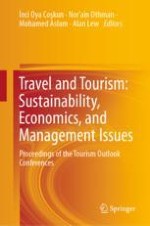2020 | OriginalPaper | Chapter
The Effect of Knowledge Sharing Practices on Employees’ Knowledge and Capabilities in the Hotel Industry in Sri Lanka
Authors : Chathuri P. Danthanarayana, P. H. T. Kumara, W. G. S. R. Wijesundara, J. Sutha
Published in: Travel and Tourism: Sustainability, Economics, and Management Issues
Publisher: Springer Singapore
Activate our intelligent search to find suitable subject content or patents.
Select sections of text to find matching patents with Artificial Intelligence. powered by
Select sections of text to find additional relevant content using AI-assisted search. powered by
